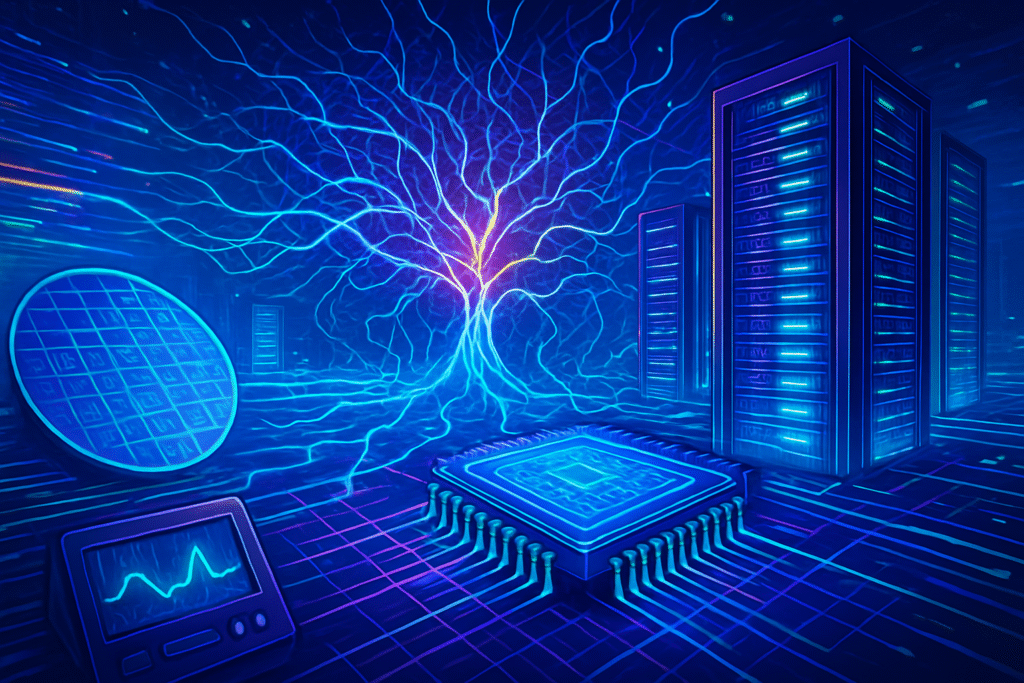
San Francisco, CA – October 6, 2025 – The burgeoning demand for artificial intelligence (AI) and the relentless expansion of data centers are creating an unprecedented surge in the semiconductor industry, with specialized testing and burn-in solutions emerging as a critical bottleneck and a significant growth driver. Recent financial results from Aehr Test Systems (NASDAQ: AEHR), a leading provider of semiconductor test and burn-in equipment, offer a clear barometer of this trend, showcasing a dramatic pivot towards AI processor testing and a robust outlook fueled by hyperscaler investments.
Aehr's latest earnings report for the first quarter of fiscal year 2026, which concluded on August 29, 2025, and was announced today, October 6, 2025, reveals a strategic realignment that underscores the profound impact of AI on chip manufacturing. While Q1 FY2026 net revenue of $11.0 million saw a year-over-year decrease from $13.1 million in Q1 FY2025, the underlying narrative points to a powerful shift: AI processor burn-in rapidly ascended to represent over 35% of the company's business in fiscal year 2025 alone, a stark contrast to the prior year where Silicon Carbide (SiC) dominated. This rapid diversification highlights the urgent need for reliable, high-performance AI chips and positions Aehr at the forefront of a transformative industry shift.
The Unseen Guardians: Why Testing and Burn-In Are Critical for AI's Future
The performance and reliability demands of AI processors, particularly those powering large language models and complex data center operations, are exponentially higher than traditional semiconductors. These chips operate at intense speeds, generate significant heat, and are crucial for mission-critical applications where failure is not an option. This is precisely where advanced testing and burn-in processes become indispensable, moving beyond mere quality control to ensure operational integrity under extreme conditions.
Burn-in is a rigorous testing process where semiconductor devices are operated at elevated temperatures and voltages for an extended period to accelerate latent defects. For AI processors, which often feature billions of transistors and complex architectures, this process is paramount. It weeds out "infant mortality" failures – chips that would otherwise fail early in their operational life – ensuring that only the most robust and reliable devices make it into hyperscale data centers and AI-powered systems. Aehr Test Systems' FOX-XP and Sonoma
and Sonoma solutions are at the vanguard of this critical phase. The FOX-XP
solutions are at the vanguard of this critical phase. The FOX-XP system, for instance, is capable of wafer-level production test and burn-in of up to nine 300mm AI processor wafers simultaneously, a significant leap in capacity and efficiency tailored for the massive volumes required by AI. The Sonoma
system, for instance, is capable of wafer-level production test and burn-in of up to nine 300mm AI processor wafers simultaneously, a significant leap in capacity and efficiency tailored for the massive volumes required by AI. The Sonoma systems cater to ultra-high-power packaged part burn-in, directly addressing the needs of advanced AI processors that consume substantial power.
systems cater to ultra-high-power packaged part burn-in, directly addressing the needs of advanced AI processors that consume substantial power.
This meticulous testing ensures not only the longevity of individual components but also the stability of entire AI infrastructures. Without thorough burn-in, the risk of system failures, data corruption, and costly downtime in data centers would be unacceptably high. Aehr's technology differs from previous approaches by offering scalable, high-power solutions specifically engineered for the unique thermal and electrical profiles of cutting-edge AI chips, moving beyond generic burn-in solutions to specialized, high-throughput systems. Initial reactions from the AI research community and industry experts emphasize the growing recognition of burn-in as a non-negotiable step in the AI chip lifecycle, with companies increasingly prioritizing reliability over speed-to-market alone.
Shifting Tides: AI's Impact on Tech Giants and the Competitive Landscape
The escalating demand for AI processors and the critical need for robust testing solutions are reshaping the competitive landscape across the tech industry, creating clear winners and presenting new challenges for companies at every stage of the AI value chain. Semiconductor manufacturers, particularly those specializing in high-performance computing (HPC) and AI accelerators, stand to benefit immensely. Companies like NVIDIA (NASDAQ: NVDA), which holds a dominant market share in AI processors, and other key players such as AMD (NASDAQ: AMD) and Intel (NASDAQ: INTC), are direct beneficiaries of the AI boom, driving the need for advanced testing solutions.
Aehr Test Systems, by providing the essential tools for ensuring the quality and reliability of these high-value AI chips, becomes an indispensable partner for these silicon giants and the hyperscalers deploying them. The company's engagement with a "world-leading hyperscaler" for AI processor production and multiple follow-on orders for its Sonoma systems underscore its strategic importance. This positions Aehr not just as a test equipment vendor but as a critical enabler of the AI revolution, allowing chipmakers to confidently scale production of increasingly complex and powerful AI hardware. The competitive implications are significant: companies that can reliably deliver high-quality AI chips at scale will gain a distinct advantage, and the partners enabling that reliability, like Aehr, will see their market positioning strengthened. Potential disruption to existing products or services could arise for test equipment providers unable to adapt to the specialized, high-power, and high-throughput requirements of AI chip burn-in.
Furthermore, the shift in Aehr's business composition, where AI processors burn-in rapidly grew to over 35% of its business in FY2025, reflects a broader trend of capital expenditure reallocation within the semiconductor industry. Major AI labs and tech companies are increasingly investing in custom AI silicon, necessitating specialized testing infrastructure. This creates strategic advantages for companies like Aehr that have proactively developed solutions for wafer-level burn-in (WLBI) and packaged part burn-in (PPBI) of these custom AI processors, establishing them as key gatekeepers of quality in the AI era.
The Broader Canvas: AI's Reshaping of the Semiconductor Ecosystem
The current trajectory of AI-driven demand for semiconductors is not merely an incremental shift but a fundamental reshaping of the entire chip manufacturing ecosystem. This phenomenon fits squarely into the broader AI landscape trend of moving from general-purpose computing to highly specialized, efficient AI accelerators. As AI models grow in complexity and size, requiring ever-increasing computational power, the demand for custom silicon designed for parallel processing and neural network operations will only intensify. This drives significant investment in advanced fabrication processes, packaging technologies, and, crucially, sophisticated testing methodologies.
The impacts are multi-faceted. On the manufacturing side, it places immense pressure on foundries to innovate faster and expand capacity for leading-edge nodes. For the supply chain, it introduces new challenges related to sourcing specialized materials and components for high-power AI chips and their testing apparatus. Potential concerns include the risk of supply chain bottlenecks, particularly for critical testing equipment, and the environmental impact of increased energy consumption by both the AI chips themselves and the infrastructure required to test and operate them. This era draws comparisons to previous technological milestones, such as the dot-com boom or the rise of mobile computing, where specific hardware advancements fueled widespread technological adoption. However, the current AI wave distinguishes itself by the sheer scale of data processing required and the continuous evolution of AI models, demanding an unprecedented level of chip performance and reliability.
Moreover, the global AI semiconductor market, estimated at $30 billion in 2025, is projected to surge to $120 billion by 2028, highlighting an explosive growth corridor. This rapid expansion underscores the critical role of companies like Aehr, as AI-powered automation in inspection and testing processes has already improved defect detection efficiency by 35% in 2023, while AI-driven process control reduced fabrication cycle times by 10% in the same period. These statistics reinforce the symbiotic relationship between AI and semiconductor manufacturing, where AI not only drives demand for chips but also enhances their production and quality assurance.
The Road Ahead: Navigating AI's Evolving Semiconductor Frontier
Looking ahead, the semiconductor industry is poised for continuous innovation, driven by the relentless pace of AI development. Near-term developments will likely focus on even higher-power burn-in solutions to accommodate next-generation AI processors, which are expected to push thermal and electrical boundaries further. We can anticipate advancements in testing methodologies that incorporate AI itself to predict and identify potential chip failures more efficiently, reducing test times and improving accuracy. Long-term, the advent of new computing paradigms, such as neuromorphic computing and quantum AI, will necessitate entirely new approaches to chip design, manufacturing, and, critically, testing.
Potential applications and use cases on the horizon include highly specialized AI accelerators for edge computing, enabling real-time AI inference on devices with limited power, and advanced AI systems for scientific research, drug discovery, and climate modeling. These applications will demand chips with unparalleled reliability and performance, making the role of comprehensive testing and burn-in even more vital. However, significant challenges need to be addressed. These include managing the escalating power consumption of AI chips, developing sustainable cooling solutions for data centers, and ensuring a robust and resilient global supply chain for advanced semiconductors. Experts predict a continued acceleration in custom AI silicon development, with a growing emphasis on domain-specific architectures that require tailored testing solutions. The convergence of advanced packaging technologies and chiplet designs will also present new complexities for the testing industry, requiring innovative solutions to ensure the integrity of multi-chip modules.
A New Cornerstone in the AI Revolution
The latest insights from Aehr Test Systems paint a clear picture: the increasing demand from AI and data centers is not just a trend but a foundational shift driving the semiconductor industry. Aehr's rapid pivot to AI processor burn-in, exemplified by its significant orders from hyperscalers and the growing proportion of its revenue derived from AI-related activities, serves as a powerful indicator of this transformation. The critical role of advanced testing and burn-in, often an unseen guardian in the chip manufacturing process, has been elevated to paramount importance, ensuring the reliability and performance of the complex silicon that underpins the AI revolution.
The key takeaways are clear: AI's insatiable demand for computational power is directly fueling innovation and investment in semiconductor manufacturing and testing. This development signifies a crucial milestone in AI history, highlighting the inseparable link between cutting-edge software and the robust hardware required to run it. In the coming weeks and months, industry watchers should keenly observe further investments by hyperscalers in custom AI silicon, the continued evolution of testing methodologies to meet extreme AI demands, and the broader competitive dynamics within the semiconductor test equipment market. The reliability of AI's future depends, in large part, on the meticulous work happening today in semiconductor test and burn-in facilities around the globe.
This content is intended for informational purposes only and represents analysis of current AI developments.
TokenRing AI delivers enterprise-grade solutions for multi-agent AI workflow orchestration, AI-powered development tools, and seamless remote collaboration platforms.
For more information, visit https://www.tokenring.ai/.





